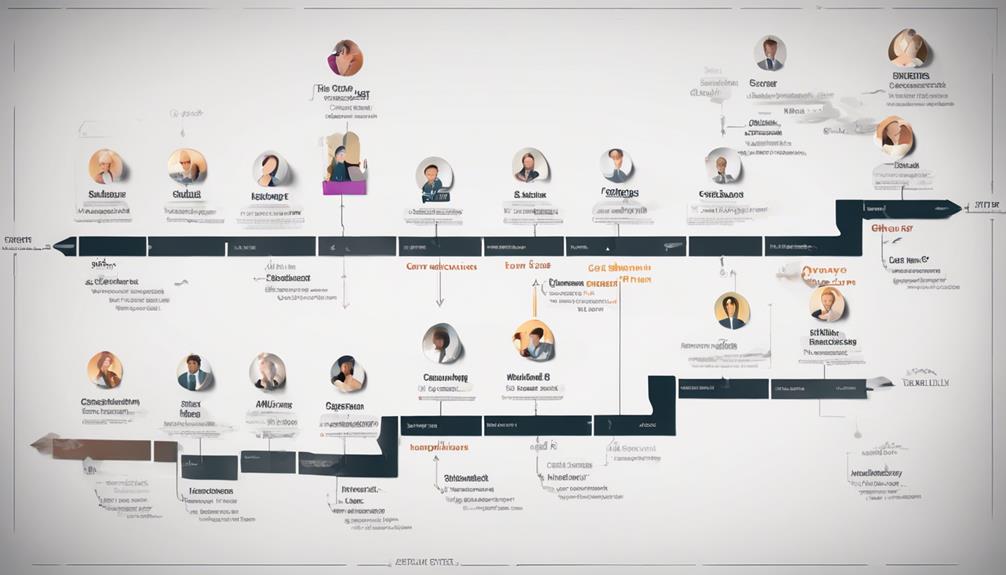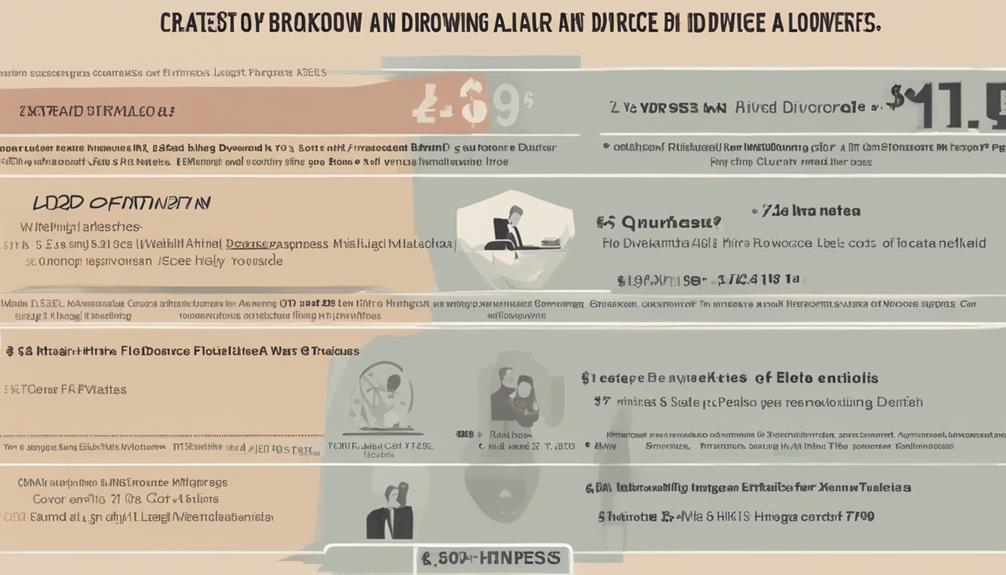Navigating the Divorce Process
How Long Does It Take to Get a Divorce in Georgia: A Step-by-Step Guide
Wander through the labyrinthine process of getting a divorce in Georgia, uncovering the twists and turns that determine the timeline of this legal journey.

Starting the process of getting a divorce in Georgia resembles journeying along a serpentine trail through a thick forest, with each step taking you nearer to the end.
The process unfolds in a series of meticulously planned stages, each crucial in its own right. As we delve into the intricacies of this legal procedure, we shed light on the timeline and key factors that can influence the duration of this emotional and legal voyage.
Let's unravel the nuanced steps that pave the way towards a new chapter in your life.
Key Takeaways
- Filing for divorce in Georgia involves submitting a Complaint, paying fees, and serving the other party.
- Respond promptly to the Complaint by filing an Answer within 30 days to avoid default judgments.
- Engage in the discovery phase to exchange financial documents and receive temporary court orders.
- Finalize the divorce through pretrial negotiations, custody arrangements, trial presentation, and a judge-issued decree.
Filing Initial Divorce Papers
When we file for divorce in Georgia, the initial step involves submitting a Complaint for Divorce to the appropriate court. This document is crucial as it outlines the grounds for divorce and the relief sought by the filing party. Additionally, filing fees are required when submitting the initial divorce papers in Georgia.
It's important to ensure that the Complaint for Divorce is properly served on the other party to kickstart the legal process. By initiating the divorce through filing the necessary paperwork, further proceedings are set in motion, paving the way for resolving the marital issues.
The filing party plays a significant role in this process by accurately completing the Complaint for Divorce and adhering to the guidelines set forth by the court. Understanding the significance of this initial step can help streamline the divorce proceedings and ensure a smoother transition into the next phases of the legal process.
Responding to Divorce Complaint

Upon being served with a divorce complaint in Georgia, it's essential to respond promptly within 30 days to address the allegations and safeguard your rights in the legal process.
When responding to a divorce complaint in Georgia, consider the following:
- Filing an Answer: Prepare and file a formal response to the divorce complaint within the specified timeframe to avoid defaults.
- Addressing Allegations: Carefully address each allegation in the divorce complaint to provide your side of the story and protect your interests.
- Legal Advice: Seeking legal advice when crafting your response can help you understand the legal implications, potential counterclaims, and defenses available to you.
- Protecting Your Rights: Responding in a timely manner is crucial to protect your rights, avoid default judgments, and keep the divorce process moving forward efficiently.
Discovery Phase and Orders
After responding to a divorce complaint in Georgia, parties enter the discovery phase where they exchange financial documents, evidence, and critical information to uncover hidden assets and debts that may impact the divorce settlement. This phase is crucial as it allows both parties to gather evidence to support their case and ensures a fair resolution. Additionally, during the divorce process, the court may issue temporary orders for child custody, support, and visitation to address immediate needs and concerns. These temporary orders help in maintaining stability for all parties involved while the divorce proceedings continue. By engaging in proper discovery practices, individuals can streamline the divorce process by facilitating informed negotiations and settlements. This ultimately helps in reaching agreements that are satisfactory to both parties and in the best interest of any children involved.
| Aspects | Description |
|---|---|
| Financial Documents | Exchange of financial records and statements |
| Temporary Orders | Court-issued orders for child custody and support |
| Evidence | Gathering of proof to support legal claims |
Pretrial Negotiations and Custody

During pretrial negotiations in Georgia, our focus is on reaching agreements regarding custody, visitation, and support arrangements before the trial commences. Establishing custody guidelines that prioritize the best interests of the child in accordance with Georgia family law is paramount. Here are some key aspects to consider during pretrial negotiations:
- Mediation Requirement: Mediation is often mandatory in Georgia during pretrial negotiations to aid in facilitating settlement discussions between the parties involved.
- Parenting Plans: Collaborating to devise comprehensive parenting plans can help streamline the divorce process by outlining clear expectations and responsibilities for each parent.
- Custody Arrangements: Setting firm guidelines for custody arrangements ensures that decisions are made with the child's best interests at heart, minimizing potential conflicts down the line.
- Visitation Guidelines: Establishing visitation guidelines during pretrial negotiations helps create a structured framework for parental visitation schedules, promoting stability and routine for the child.
Divorce Trial and Finalization
As we proceed to the crucial stage of the divorce process, the divorce trial signifies the culmination of efforts to resolve unresolved issues before a judge or jury in Georgia. During the trial, parties present evidence, witness testimonies, and closing statements to support their case. A judge issues a verdict based on the evidence presented and finalizes the divorce by issuing a final decree of divorce. The trial becomes necessary when parties cannot reach agreements on key issues such as asset division, alimony, or child custody. Proper courtroom etiquette, including punctuality, appropriate attire, and respectful behavior towards the judge, is essential during the divorce trial.
| Key Points | Details | Importance |
|---|---|---|
| Evidence Presentation | Parties present evidence to support their case | Crucial for the judge's decision |
| Witness Testimonies | Witnesses provide testimonies to strengthen arguments | Adds credibility to the case |
| Closing Statements | Parties make final arguments summarizing their case | Leaves a lasting impression |
In the courtroom, maintaining decorum and professionalism is paramount as it can influence the judge's perception of the case and impact the final outcome.
Frequently Asked Questions
Can I Change My Mind and Stop the Divorce Process Once It Has Started?
Yes, we can stop the divorce process after it has started by filing a request for dismissal or by mutual agreement. It's crucial to consider the legal implications and potential consequences before making this decision.
How Does the Court Determine Alimony Payments in a Divorce Case?
When determining alimony payments in a divorce case, the court considers factors like the length of the marriage, each spouse's financial situation, contributions to the marriage, and standard of living. These aspects guide the court's decision-making process.
What Happens if My Spouse Refuses to Participate in the Divorce Proceedings?
When a spouse refuses to participate in divorce proceedings, it can complicate matters. Legal avenues exist to move forward, such as serving them with papers or seeking a default judgment. We can guide you through this challenging process.
Is It Possible to Get a Divorce Without Going to Court?
Yes, it is possible to get a divorce without going to court in Georgia. We can help you navigate mediation or collaborative divorce options that allow for a smoother process outside of the courtroom.
How Will Our Shared Assets and Debts Be Divided During the Divorce Process?
During the divorce process, our shared assets and debts will be equitably divided. We'll work with legal counsel to ensure fairness. Understanding each other's needs is key. Transparency and compromise can lead to a smoother resolution.
Conclusion
In conclusion, navigating the divorce process in Georgia can feel like a rollercoaster ride through uncharted territory. Just like a skilled pilot guides their plane through turbulence, having the right legal support can help you navigate the ups and downs of divorce proceedings with confidence and clarity.
Remember, you aren't alone in this journey, and with the right guidance, you can successfully navigate towards a brighter future.
Allison is the driving force behind our content, ensuring that every piece of information we share is both empowering and insightful. With a keen eye for detail and a deep understanding of the divorce process, Allison curates content that speaks directly to the needs of our audience. Her expertise ensures that How Get Divorce remains a trusted and authoritative source of guidance for those navigating the difficult waters of divorce.
Navigating the Divorce Process
How to Get Your Attorney Fees Paid in a Divorce
In navigating divorce, understanding how to secure payment for attorney fees is crucial, but what happens if you miss a critical step?

Navigating through the intricacies of divorce, making sure you have your legal fees covered is an essential component of the process. For example, in some areas, like Texas, it’s crucial to incorporate a formal plea for the payment of fees in your initial divorce filing.
But what happens if this step is overlooked or not done correctly? Understanding the underlying principles and legal strategies that influence the payment of attorney fees in a divorce can significantly impact the outcome of your case.
Let's explore the nuances of getting your attorney fees paid in a divorce and the strategic approaches that can help secure financial assistance for legal representation.
Key Takeaways
- Request interim attorney fees based on financial need during divorce.
- Judges can order fee payments from community assets or spouse's income.
- Discuss financial situation openly to negotiate fair attorney fee payment.
- Consider alternative payment sources like selling assets or incurring debt.
Legal Options for Attorney Fees
When facing the financial burden of attorney fees in a divorce, understanding the legal options available is crucial for securing fair representation. In a community property state like Texas, spouses may be entitled to have their attorney fees paid from community assets.
Interim attorney fees can also be requested during the divorce proceedings to ensure both parties have access to legal representation. It's essential to seek legal assistance to navigate the complexities of these financial matters.
Judges have the authority to order payment of attorney fees based on the ability to pay from community assets. They carefully assess the reasonableness of the fees requested and may order payment from various sources. Methods to pay one's spouse's attorney fees can include making periodic payments from income, selling nonliquid property, or even incurring debt if necessary.
Ensuring that attorney fees are addressed promptly and fairly is crucial, especially in cases involving child custody where legal representation is vital for protecting one's rights.
Factors Influencing Fee Payment

Considering the financial dynamics at play in a divorce, various factors come into play when determining the payment of attorney fees, with the court weighing the financial standing of both parties as a critical influencer in the decision-making process. In Texas, attorney fees are considered community property until the divorce is finalized. Interim fees can be requested during the ongoing divorce process based on financial need. It's crucial to note that bad faith actions like hiding assets or non-compliance with court orders can lead to one spouse being responsible for paying the other's attorney fees. Additionally, judges may order one spouse to pay the other's fees to ensure equal access to legal representation. Fairness and equal representation are significant considerations for the court when making payment determinations regarding attorney fees in a divorce. Below is a table summarizing the key factors influencing fee payment:
| Factors | Influence on Fee Payment |
|---|---|
| Financial Status | Critical consideration |
| Bad Faith Actions | Responsibility for fees |
| Interim Fees | Based on financial need |
| Equal Representation | Ensuring fairness |
| Court Orders | Compliance importance |
Financial Considerations and Strategies
Understanding the financial implications and implementing effective strategies play a crucial role in navigating the payment of attorney fees during a divorce. It's important for both spouses to consider the financial status of each party when requesting payment of attorney fees.
In the legal realm, judges have the authority to order one spouse to pay the other's attorney fees based on just and right division principles. Temporary fees can be sought through a Motion for Interim Attorney Fees to cover ongoing legal costs. Spouses may need to provide justification for the reasonableness of the fees requested by their attorneys.
Exploring alternative payment sources, such as selling nonliquid assets or incurring debt, can be viable strategies to cover attorney fees during the divorce process. By being mindful of the financial aspects and leveraging available legal options, both parties can work towards a fair resolution in the payment of attorney fees.
State-Specific Laws and Resources

Navigating the intricacies of divorce laws and available resources in your state can significantly impact the outcome of attorney fee payments. In Texas, understanding the state-specific laws related to attorney fees is crucial for a successful divorce process. Here are some key points to consider:
- Attorney fees: In Texas, attorney fees can be requested in the original petition for divorce.
- Financial status: Texas courts take into account the financial status of both parties when determining attorney fee payments.
- Income disparity: Judges may order one spouse to pay the other's attorney fees in cases of significant income disparity.
- Bad behavior: Engaging in bad behavior during the divorce process, like hiding assets or not complying with court orders, can result in paying the other party's attorney fees.
- Interim fees: Interim attorney fees can be requested to ensure legal representation for both parties throughout the divorce process.
Understanding these nuances can help you navigate the legal landscape effectively and secure fair attorney fee payments in Texas courts.
Negotiating Attorney Fees Efficiently
Let's smoothly shift our focus to efficiently negotiating attorney fees by strategizing smartly and communicating effectively during the divorce process. When dealing with attorney fees, it's crucial to discuss your financial situation openly with your legal representative to assess if your spouse can be held accountable for covering these costs. Providing evidence of your spouse's higher income or financial advantage can strengthen your case for them to pay your attorney fees. Negotiation plays a key role here; aim to reach a mutual agreement with your spouse or their attorney on sharing or covering the attorney fees to prevent court intervention. Be ready to justify the reasonableness of the fees and expenses incurred during the process. If your spouse is unwilling or unable to cover these costs, explore alternative payment arrangements like selling assets or securing a loan. Efficient negotiation is the cornerstone of getting your attorney fees paid in a divorce.
| Efficient Negotiation Tips | |
|---|---|
| Discuss Financial Situation | Provide Evidence of Spouse's Higher Income |
| Negotiate with Spouse | Justify Attorney Fees & Expenses |
| Consider Alternative Payments | Avoid Court Intervention |
Frequently Asked Questions
Who Loses the Most in a Divorce?
In a divorce, the spouse with higher income or more assets may bear more legal fees. Financial disparities impact who shoulders expenses. Court decisions consider income and assets. Fair representation access involves financial need and conduct influences fees responsibility.
Can My Spouse Make Me Pay Her Divorce Attorney Fees in Texas?
We understand the concern about spouses making each other pay attorney fees in Texas. Financial circumstances, assets, and behavior influence this decision. It's crucial to address attorney fees in the original petition for the court to consider them.
Who Pays for a Divorce in Texas?
We share insights on who pays for a divorce in Texas based on financial circumstances and court orders. Factors like income and assets influence fee payments. Community property laws affect division. Seeking temporary fees through a Motion for Interim Attorney Fees can assist.
How to Get a Free Divorce in Texas?
Getting a free divorce in Texas isn't possible, but cost-reducing options exist. Seek assistance from county legal clinics, pro bono services, or apply for fee waivers. With diligence, affordability in divorce proceedings can be achieved.
Conclusion
In the journey of divorce, remember: 'You get what you pay for.' By seeking legal guidance and understanding your options for attorney fee payment, you can navigate this challenging time with confidence and support.
Don't let financial concerns hold you back from obtaining the representation you deserve. Stay informed, stay proactive, and remember that your well-being is worth the investment in quality legal assistance.
Allison is the driving force behind our content, ensuring that every piece of information we share is both empowering and insightful. With a keen eye for detail and a deep understanding of the divorce process, Allison curates content that speaks directly to the needs of our audience. Her expertise ensures that How Get Divorce remains a trusted and authoritative source of guidance for those navigating the difficult waters of divorce.
Navigating the Divorce Process
How Much Does It Cost to Get a Divorce in Florida: a Complete Guide
Open the door to understanding the intricate costs of divorce in Florida for a couple with assets and complex custody, revealing surprising insights.

Imagine a scenario in which a couple, who owns considerable assets and has a complicated arrangement for child custody, opts to file for divorce in Florida. The financial impact of this situation can be significant, leading to inquiries regarding the overall costs and the strategies for managing them efficiently.
Understanding the breakdown of costs, from legal fees to court expenses, is crucial for anyone navigating the divorce process in Florida. By exploring the nuances of divorce costs in the state and the various factors that influence them, individuals can make informed decisions about their next steps in this challenging process.
Key Takeaways
- Divorce costs in Florida range from $5,000 to $30,000, influenced by various factors.
- Uncontested divorces cost under $500 for DIY paperwork or up to $5,000 with lawyer assistance.
- Contested divorces in Florida can range from thousands to tens of thousands of dollars.
- Hiring a divorce lawyer in Florida averages $300 per hour, impacting overall divorce expenses.
Average Cost of Divorce in Florida
When considering the average cost of divorce in Florida, it's essential to understand the varying factors that can significantly impact the overall expenses involved.
In Florida, the average cost of divorce ranges between $5,000 and $30,000. This range is influenced by various factors such as marital property, debts, presence of children under 18, alimony requests, attorney fees, and the duration of legal proceedings.
The financial implications of divorce can be substantial, especially when legal representation is needed. On average, lawyers in Florida charge around $300 per hour, which can quickly add up throughout the divorce process.
Additionally, the willingness of both spouses to compromise and the decision to hire experts for evaluations can also affect the total cost of divorce.
Understanding these financial considerations and planning accordingly can help spouses navigate the complexities of divorce in Florida more effectively.
Uncontested Divorce Costs in Florida

How do uncontested divorce costs in Florida compare to traditional legal proceedings? In Florida, uncontested divorce costs can vary significantly depending on the approach taken. Here is a breakdown of the costs associated with uncontested divorces in Florida:
| Aspect | Cost Range | Details |
|---|---|---|
| DIY Paperwork | Under $500 | Can be a cost-effective option for couples in agreement. |
| Lawyer Assistance | $3,000-$5,000 | Hiring a lawyer can provide legal guidance but at a higher cost. |
| Filing Fees | $408-$409 | Required fees for filing the divorce paperwork with the court. |
| Online Services | Under $650 | Online services offer a middle ground in terms of cost and assistance. |
Factors such as mutual agreement between spouses and minimal court involvement contribute to the lower costs of uncontested divorces in Florida. Additionally, individuals who cannot afford traditional legal fees may explore options like the Application for Determination of Indigent Status to help reduce costs.
Contested Divorce Expenses in Florida
Contested divorce expenses in Florida can vary significantly based on the complexity of the case, ranging from several thousand dollars to tens of thousands. When navigating a contested divorce in Florida, individuals may encounter various costs that contribute to the overall financial implications of the legal process. Some key factors influencing the contested divorce cost include:
- Expert Witnesses: In cases requiring specialized knowledge, such as child custody evaluations or financial assessments, the involvement of expert witnesses can escalate expenses.
- Property Division: Evaluating and dividing assets in a contested divorce often involves hiring appraisers to determine the value of properties, businesses, or other shared assets.
- Court Filing Fees: Alongside attorney fees, court filing fees and document serving costs are essential components that impact the total expenses of a contested divorce in Florida.
Understanding these financial issues is crucial for individuals going through a contested divorce, as it helps in anticipating and managing the costs associated with the legal proceedings.
Cost of Divorce Lawyer in Florida

Divorce lawyer fees in Florida typically range from an average hourly rate of $300, with retainer fees falling between $2,000 and $5,000. Attorney fees in the state can vary between $260 and $330 per hour, depending on various factors such as case complexity, assets involved, and whether there are children in the picture.
It's essential to consider these aspects when budgeting for legal representation during a divorce. Additionally, Florida law mandates transparency in the types of retainers lawyers use when hired for divorce cases. This transparency ensures that clients understand how their money is being allocated throughout the legal process, offering a level of reassurance during what can be a challenging time.
When navigating the court system, filing paperwork, and advocating for your rights, having a knowledgeable and compassionate attorney by your side can make a significant difference in the outcome of your case.
Factors Affecting Florida Divorce Costs
Considering the multiple facets involved in divorce proceedings, understanding the factors that influence the costs in Florida is crucial for individuals embarking on this legal journey. When it comes to Florida divorce costs, several key elements play a significant role:
- Child Custody and Support: Disputes regarding child custody, visitation rights, and child support can escalate legal fees due to the complexity and emotional nature of these issues.
- Alimony: Claims for alimony can substantially impact the overall expenses of a divorce in Florida, especially if there are disagreements over the amount and duration of support.
- Property Division: Complex property and debt issues often lead to higher divorce costs in Florida, as the equitable distribution of assets requires meticulous evaluation and negotiation.
These factors, along with the need for expert witnesses, hourly rates charged by attorneys, and court costs, all contribute to the financial matters that individuals face when navigating a divorce in Florida. Understanding these influences can help individuals prepare for the potential costs associated with their divorce proceedings.
Frequently Asked Questions
How Much Does It Cost to Get a Divorce in Florida if Both Parties Agree?
If both parties agree, a divorce in Florida can cost less, with DIY paperwork under $500 and online help under $650. Legal assistance typically ranges from $3,000 to $5,000, while filing fees are around $408 to $409.
What Is the Cheapest Way to Get a Divorce in Florida?
Getting a divorce in Florida on a budget? Opting for an uncontested divorce is your best bet. With costs under $500 for DIY paperwork or around $650 with online assistance, it's a cost-effective solution for separations.
How Much Is the Filing Fee for Divorce in Florida?
The filing fee for divorce in Florida ranges from $408 to $409. It's a mandatory cost for initiating the process in Florida courts, covering paperwork processing. Budgeting for this fee is crucial to avoid delays in proceedings.
Can My Spouse Make Me Pay Her Divorce Attorney Fees in Florida?
We understand the concern about spousal payment for attorney fees in Florida. Courts may order one spouse to cover the other's fees based on need and ability to pay. Consulting an attorney for personalized guidance is crucial.
Conclusion
In conclusion, navigating the costly waters of divorce in Florida can be a challenging journey. Despite our best efforts to keep expenses low, the irony is that the emotional and financial toll can often exceed our expectations.
Remember to tread carefully, seek guidance when needed, and prioritize finding a resolution that's both fair and affordable. The price of divorce may be steep, but the cost of peace of mind is priceless.
Allison is the driving force behind our content, ensuring that every piece of information we share is both empowering and insightful. With a keen eye for detail and a deep understanding of the divorce process, Allison curates content that speaks directly to the needs of our audience. Her expertise ensures that How Get Divorce remains a trusted and authoritative source of guidance for those navigating the difficult waters of divorce.
Navigating the Divorce Process
How Soon Can You Get Married After a Divorce?
Delve into the intricacies of remarriage post-divorce in Texas and discover the crucial factors influencing the timing.

In Texas, individuals are required to wait 30 days following the finalization of their divorce before they are permitted to enter into another marriage.
The timing of when to tie the knot again after a divorce can be a complex decision influenced by various factors. From legal obligations and emotional readiness to financial implications and the well-being of any children involved, there are crucial considerations to ponder.
Understanding the nuances surrounding this matter can help individuals navigate the post-divorce landscape with clarity and foresight, ensuring a smoother transition into a new chapter of their lives.
Key Takeaways
- Compliance with state waiting periods is crucial to remarry legally and avoid complications.
- Emotional readiness through therapy and reflection is essential before entering a new marriage.
- Financial considerations like alimony and asset review are vital when remarrying.
- Consider the impact on children and ensure open communication to ease the transition into remarriage.
Legal Waiting Periods
When considering the legal waiting periods after a divorce, it's essential to understand the specific requirements set by each state to ensure a smooth remarriage process. In Texas, the law mandates a 30-day waiting period post-divorce before entering into a new marriage. This waiting period is crucial as it allows individuals time to reflect on their decisions and ensures they're ready for a new commitment. Exceptions to this waiting period include scenarios where individuals wish to remarry their former spouse immediately. In certain cases, judges have the authority to waive this waiting period, typically for reasons such as deployment or health emergencies.
It is important to note that failing to comply with the waiting period can lead to legal challenges such as bigamy charges. Thus, to secure a remarriage without potential legal ramifications, strict compliance with the waiting period is necessary. By understanding and adhering to the legal requirements set by the state, individuals can navigate the remarriage process smoothly and confidently.
Emotional Readiness

Understanding your emotional readiness is a crucial aspect to consider before deciding to remarry after a divorce. It's important to take the time needed to heal and reflect on past experiences to make an informed decision about remarriage. Seeking therapy or counseling to address any unresolved emotions from the previous marriage can significantly contribute to your emotional readiness.
Additionally, understanding your personal goals, values, and expectations for a new relationship is essential before considering remarriage. Here are some practical steps to help you assess your emotional readiness:
- Seek therapy or counseling to address unresolved emotions.
- Reflect on personal goals, values, and expectations.
- Build a strong support system of friends, family, or professionals.
Financial Considerations
Considering the financial impact of remarriage post-divorce is crucial for setting a solid foundation for your future together. When contemplating remarriage, it's essential to understand how alimony payments may be affected. In most states, these payments typically cease upon remarriage, directly impacting your financial situation.
Reviewing beneficiary designations on financial accounts is also vital to ensure your assets are distributed according to your wishes in the event of any unforeseen circumstances. Additionally, taking into account how child support payments may be influenced by remarriage is crucial for effective financial planning.
Evaluating property and asset division agreements from the previous divorce is important to avoid any conflicts or misunderstandings in the future. Setting clear financial goals and openly discussing them with your future spouse can help align your visions and ensure a harmonious financial future together.
Impact on Children

Children navigating their parents' remarriage post-divorce may experience emotional challenges that require careful consideration and support. When it comes to the impact on children, rushing into a new marriage can lead to instability and hinder their ability to cope with the divorce process. To navigate this sensitive time effectively, open communication plays a pivotal role in helping children express their feelings and concerns.
Here are some key points to consider:
- Loyalty Conflicts and Abandonment: Children may struggle with conflicting loyalties or feelings of abandonment if a parent rushes into a new marriage too quickly after a divorce.
- Communication is Key: Engaging in open and honest conversations with children about the upcoming marriage can help alleviate anxiety and uncertainty.
- Building a Strong Foundation: Establishing a strong foundation with children before introducing a new spouse can aid in creating a smoother transition and fostering acceptance of the new family dynamic.
Role of Legal Counsel
Navigating the complexities of remarriage after divorce often necessitates the involvement of legal counsel to ensure a smooth and legally compliant process. A family law attorney can provide expert legal guidance on the state-specific laws and requirements governing remarriage after divorce. They can assist in understanding the waiting period and waiver process, expediting the necessary steps for remarriage.
By seeking the help of a legal professional, individuals can ensure the protection of their rights and address all legal considerations before entering a new marriage. Legal representation is crucial to prevent potential issues such as bigamy charges or conflicts over property division that may arise during the remarriage process.
With the assistance of a knowledgeable family law attorney, individuals can navigate the legal requirements with confidence and clarity, making the transition into a new marital relationship smoother and legally sound.
Frequently Asked Questions
How Soon Can You Marry Someone After a Divorce?
We understand the urgency post-divorce, but legal guidelines dictate the waiting period before remarriage. Consult a family law attorney for the best course of action. Navigating this process correctly is crucial.
How Soon Is Too Soon to Remarry After Divorce?
Getting remarried too soon after a divorce can pose legal risks and emotional challenges. It's crucial to allow time for healing and reflection to build a strong foundation for a new relationship.
Can You Get Engaged While Going Through a Divorce?
Sure thing! Engaging while divorcing is legally fine. It won't affect the process or wait time to remarry. An engagement is about future plans, not the legal divorce. It's important to separate engagement from actual remarriage.
Is It Hard to Get Married After Divorce?
Getting married after divorce in Texas may pose challenges due to the mandatory waiting period. Judges can waive it for valid reasons. To avoid legal issues, finalize the divorce, adhere to the waiting period, and seek legal counsel for guidance.
Conclusion
We understand that waiting 30 days to remarry after a divorce may seem difficult, but it's crucial to follow the legal requirements for a smooth transition.
By waiting, you can ensure a legally secure marriage without any potential issues like bigamy charges.
Remember, taking the time to properly finalize your divorce and wait the 30 days will ultimately lead to a healthier and more stable next step in your life.
Allison is the driving force behind our content, ensuring that every piece of information we share is both empowering and insightful. With a keen eye for detail and a deep understanding of the divorce process, Allison curates content that speaks directly to the needs of our audience. Her expertise ensures that How Get Divorce remains a trusted and authoritative source of guidance for those navigating the difficult waters of divorce.
-

 Navigating the Divorce Process2 months ago
Navigating the Divorce Process2 months agoNavigating the Complexity: Divorce Document Preparation Services Explained
-

 Life After Divorce2 months ago
Life After Divorce2 months agoTD Jakes: Life After Divorce – A Journey of Healing
-

 Financial Aspects2 months ago
Financial Aspects2 months agoFinancial Advisor's Guide to Navigating Divorce Finances
-

 Supporting Children Through Divorce2 months ago
Supporting Children Through Divorce2 months agoPositive Effects of Divorce on Children: A Guide to Understanding
-

 Navigating the Divorce Process2 months ago
Navigating the Divorce Process2 months agoDivorce Lawyers New Orleans: Your Ultimate Guide to Legal Separation and Family Law
-

 Navigating the Divorce Process2 months ago
Navigating the Divorce Process2 months agoNavigating Divorce with a Muslim Divorce Lawyer
-

 Directory2 months ago
Directory2 months agoCompassionate Vista Divorce Attorney | Family Law Help
-

 Navigating the Divorce Process2 months ago
Navigating the Divorce Process2 months agoUnderstanding Dominican Republic Divorce Law







































